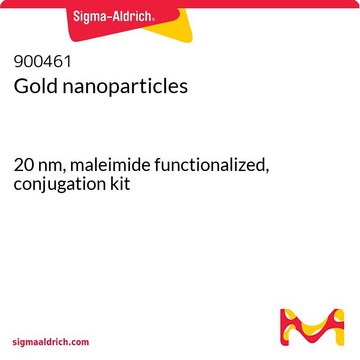900475
Gold nanoparticles
20 nm, NHS ester functionalized, conjugation kit
Sinónimos:
NHS-activated gold nanoparticles
About This Item
Productos recomendados
form
nanoparticles
shelf life
12 mo. at -20 °C (If stored unopened and as specified, are stable for at least 12 months)
packaging
pkg of 1 ea
storage condition
protect from light
particle size
20 nm
λmax
524 nm
functional group
NHS ester
storage temp.
−20°C
¿Está buscando productos similares? Visita Guía de comparación de productos
Categorías relacionadas
General description
•3 vials of 20 nm NHS-Activated Gold Nanoparticles (lyophilized)
•Protein Resuspension Buffer - 1.5ml
•Reaction Buffer - 1.5ml
•Quencher Solution - 1.5ml
•Reaction protocol
The gold nanoparticles in this kit are supplied as a lyophilized (freeze-dried) mixture. The conjugation reaction is initiated by simply reconstituting the freeze-dried nanoparticles with the protein of interest, which attaches to the nanoparticle surface via lysine residues. The gold conjugation procedure has a quick hands-on time of around 10 minutes, and the conjugate is fully ready for use within 3 hr. Researchers only need to pipette the biomolecule into a vial containing the nanoparticles, quench the reaction, and perform product washing through microcentrifugation.
The provided protocol is optimized for highly efficient covalent conjugation, resulting in stable gold nanoparticle conjugates. Optional protocol steps involve additional materials, such as 10% aqueous BSA (126615) and Tris saline resuspension buffer (PPB002), which are sold separately.
Application
Different sizes of gold nanoparticles perform better in specific applications. For lateral flow and flow cytometry, we recommend using gold nanoparticles with diameters between 20 nm and 100 nm. For immunoblotting or immuno-electron microscopy, the optimal range is 5 nm to 40 nm. For bioassays utilizing dynamic light scattering, gold nanoparticles with diameters ranging from 60 nm to 100 nm are suggested.
Features and Benefits
•Fast and convenient conjugation reaction with no need for pre-activation.
•A spacer between the gold nanoparticle surface and the conjugated ligand minimizes the impact on the tertiary protein structure. This reduces the likelihood of poor performing conjugates, a common issue encountered with conjugates prepared by passive adsorption.
•Gold surface coating is precisely engineered to minimize non-specific protein binding in biological assays.
Legal Information
Storage Class
10 - Combustible liquids
flash_point_f
Not applicable
flash_point_c
Not applicable
Elija entre una de las versiones más recientes:
Certificados de análisis (COA)
Lo sentimos, en este momento no disponemos de COAs para este producto en línea.
Si necesita más asistencia, póngase en contacto con Atención al cliente
¿Ya tiene este producto?
Encuentre la documentación para los productos que ha comprado recientemente en la Biblioteca de documentos.
Los clientes también vieron
Artículos
The CRISPR/Cas9 system has recently emerged as a highly specific, efficient, and versatile gene editing technology that can be utilized to build disease models and correct diseased genes. Safe and effective delivery vectors for the CRISPR/Cas9 system are in critical need to enable clinical development and future applications of CRISPR/Cas9 systems. Professor Yang Liu summarizes recent progress in nonviral nanoparticle approaches for CRISPR/Cas9 delivery.
Drs. Fernandes and Baptista explore the synthesis and functionalization of gold nanoparticles and their use in molecular diagnostics, focusing on lateral flow assays. They further discuss the regulations and standards of these materials, as well as the future outlook and challenges.
Nuestro equipo de científicos tiene experiencia en todas las áreas de investigación: Ciencias de la vida, Ciencia de los materiales, Síntesis química, Cromatografía, Analítica y muchas otras.
Póngase en contacto con el Servicio técnico






